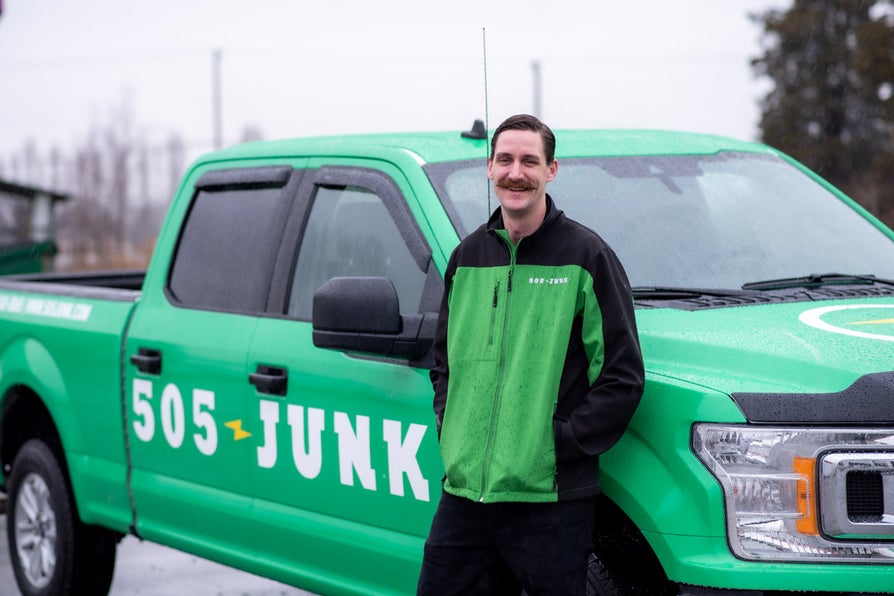
Featuring: Alex Elsey, 505-Junk.
"We chose to set up our business in South Delta because we were born and raised here. Although we serve the entire Lower Mainland, we’ll always have our roots here."
After sequestering in your home for over a year, you’ve likely tackled some home organizational projects. While it feels good to cross things off your to-do list, now you have a pile of junk ready for removal. Maybe you’re busy with work or family, or perhaps you’re missing Delta’s Spring Clean-up and have no truck to transport it yourself, so you turn to the experts.505-Junk is a locally owned and operated junk removal and recycling company specializing in residential, commercial, and construction pickups throughout Greater Vancouver and the Fraser Valley. Working with them is simple: they send a truck team of two that does all the loading and lifting for you, with your final cost determined by weight. The company’s transparent pricing is accomplished through its innovative on-board truck weighing system, certified by Measurement Canada. We spoke with Director of Operations Alex Elsey to find out how 505-Junk—celebrating its 10th anniversary this year—is revolutionizing the industry by building close relationships with recyclers and second-hand stores to carefully consider repurposing or end-of-life options for everything they remove. Items are thoughtfully sorted, old furniture still in great condition is salvaged, and as much as possible is donated prior to delivering recyclable materials and junk to their industry partners. Known for his accomplished handlebar moustache and enormous heart, Alex is the friendly guy driving through your neighbourhood in the green truck, fostering honest relationships in his management role or volunteering his time doing shoreline clean-ups or raising money for Delta Secondary’s dry grad. His passion for his work, clients, and team culture first positioned him as frontman and then partner to 505-Junk’s co-founders Barry Hartman and Scott Foran.
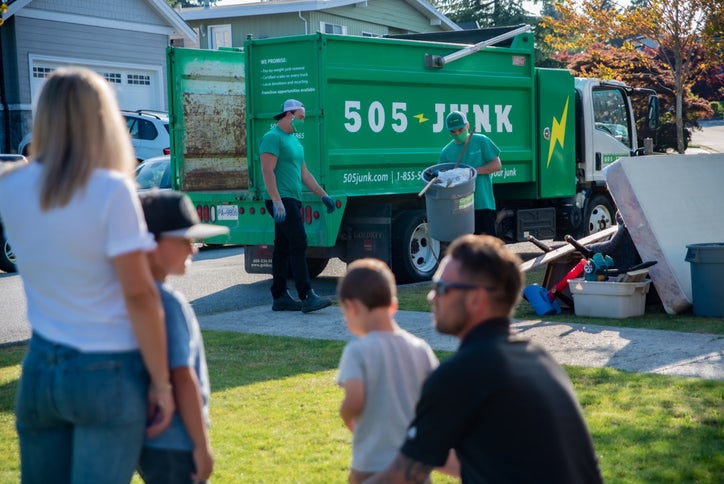
You may be the only junk removal company with scales on your trucks. Tell us how this unique model works and why it’s an important part of your business plan?
In the Lower Mainland, junk removal is about a $30 million dollar a year industry; factoring that into your brain is crazy, right? There are just so many little companies, and only a couple bigger ones. We're right there with them, but we've only been around for 10 years while they've been around for about 30. So by disrupting the industry with our transparent exact weight model, we're growing very quickly.
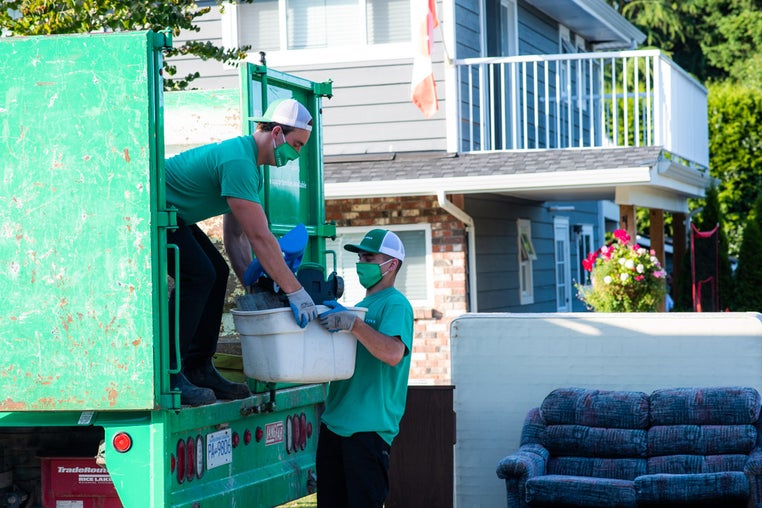
Do your clients consider recycling and donations an important aspect of your service?
One of the most impressive things I've seen change over the last few years is people spending more time making sure that they're sorting and recycling their stuff properly. With households being more conscious of separating cardboard from plastics from food waste, we see our clients being very conscious of their environmental footprint and the end of life of their materials. I think that’s why they're so big on the donation aspect. When it comes to consumer choices, everyone is saying “do I really need something brand new, or can I get something secondhand?” And there's the benefit of the reduced cost, but there’s also the benefit of not burning through so many non-renewable resources and ultimately lightening the load on Mother Nature.
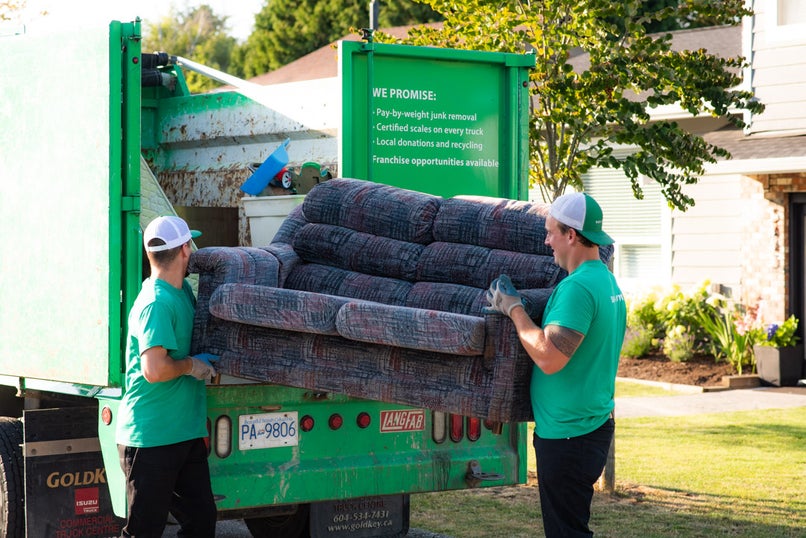
Tell us what it’s like to help people clear out items they’ve held onto for a long time, and why you’re committed to this business?
I get to coach and train and work with some of the best people I've ever met; I really enjoy watching people I consider lifelong friends develop and grow and get better every day. We do a lot of promotion from within. There’s a sort of succession plan that starts with working in the trucks and getting to know the business and the importance of customer service, and there’s really a limitless ceiling as we continue to grow. I don't think anybody in our company looks at this as just a job; it’s almost a lifestyle and that's what makes our culture great and why I’m so committed.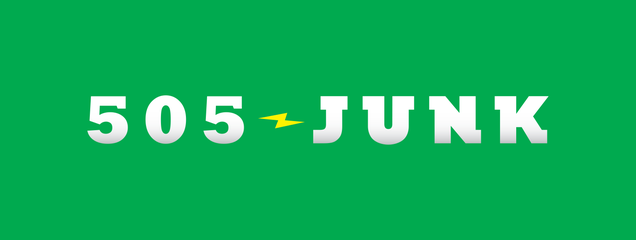
Connect with 505-Junk on Facebook or visit their website for service in Ladner, Tsawwassen or beyond. Sign up for our e-newsletter to receive customized South Delta real estate reports, community news, and more business + lifestyle features like these. Interested in being featured or know someone we should feature? Please get in touch.
After sequestering in your home for over a year, you’ve likely tackled some home organizational projects. While it feels good to cross things off your to-do list, now you have a pile of junk ready for removal. Maybe you’re busy with work or family, or perhaps you’re missing Delta’s Spring Clean-up and have no truck to transport it yourself, so you turn to the experts.505-Junk is a locally owned and operated junk removal and recycling company specializing in residential, commercial, and construction pickups throughout Greater Vancouver and the Fraser Valley. Working with them is simple: they send a truck team of two that does all the loading and lifting for you, with your final cost determined by weight. The company’s transparent pricing is accomplished through its innovative on-board truck weighing system, certified by Measurement Canada. We spoke with Director of Operations Alex Elsey to find out how 505-Junk—celebrating its 10th anniversary this year—is revolutionizing the industry by building close relationships with recyclers and second-hand stores to carefully consider repurposing or end-of-life options for everything they remove. Items are thoughtfully sorted, old furniture still in great condition is salvaged, and as much as possible is donated prior to delivering recyclable materials and junk to their industry partners. Known for his accomplished handlebar moustache and enormous heart, Alex is the friendly guy driving through your neighbourhood in the green truck, fostering honest relationships in his management role or volunteering his time doing shoreline clean-ups or raising money for Delta Secondary’s dry grad. His passion for his work, clients, and team culture first positioned him as frontman and then partner to 505-Junk’s co-founders Barry Hartman and Scott Foran.

You may be the only junk removal company with scales on your trucks. Tell us how this unique model works and why it’s an important part of your business plan?
Our Co-founders Scott and Barry came up with the idea and design. The trucks are regular Isuzu NRRs with normal chassis, but they found a way to build a sub chassis on top that allows the scales to be attached and basically make the box float. That's how we're able to weigh all the material in the truck—it is pretty revolutionary. Nobody's ever attached scales to a truck in this form, but it’s reminiscent of an old technology from logging. Lumber trucking was done by weight, so a company called Rice Lake in Washington used industrial scales on their logging trucks. Scott basically thought well, why can't we put that on our trucks? And so after about a year of trial and error, we found the right fabricator to make it happen.
In the Lower Mainland, junk removal is about a $30 million dollar a year industry; factoring that into your brain is crazy, right? There are just so many little companies, and only a couple bigger ones. We're right there with them, but we've only been around for 10 years while they've been around for about 30. So by disrupting the industry with our transparent exact weight model, we're growing very quickly.
How did 505-JUNK start and why was South Delta chosen as its HQ?
The two co-founders of the company—Barry and Scott—were both in school and living at home with their parents at the time. Barry was a professional snowboarder who broke his ankle playing soccer; he took that opportunity to go to Kwantlen University, where he met Scott. They did a marketing project together where they were tasked with building a fictitious business and successfully scaling it. While they were doing the project, they figured out that junk removal was a highly underserved market that hadn't been shook up in a long time. There was 1-800-GOT-JUNK, which everybody knows about, and then a bunch of mom-and-pop companies that all basically do things the same way: they charge by volume instead of by exact weight.
So Barry and Scott have the idea: why not charge clients by the exact weight as opposed to by volume, since every junk removal company pays by weight at the transfer station? They were able to build a business model that charges by exact weight, add a little bit of markup to the pricing structure to cover dump costs, gas, wages, and insurance, and all of a sudden 505-Junk was born. As for why they wanted to do it in South Delta—they're from here, as am I. Our roots will forever be in Tsawwassen, even though we service a very large territory: the entire Lower Mainland, from the North Shore to Chilliwack. We care a lot about our community because it’s given us so much in terms of support and positive feedback. And we find it's only fair that we give where we live! Pardon the rhyme, but it's such an accurate saying.

Do your clients consider recycling and donations an important aspect of your service?
Absolutely! We load our customer’s items with extreme care and decide whether there are some items that can be dropped at a thrifter. We’re the first line of defense in terms of sorting material on site, then we bring it to the privatized transfer station on Mitchell Island before making the appropriate drop offs to all the different transfer station locations. Once that material arrives at the transfer station, they, in turn, sort it and ship it to different locations across North America. For example, all drywall goes to New West Gypsum, gets a hundred percent loaded up all together and recycled elsewhere, like Alberta. Clean wood normally goes to Richmond Eco Waste; they sell that material to other suppliers. Reusing wood is completely possible, too; you don't have to burn it, or it doesn't just have to sit and decompose. They even cut lengths (anything larger than three feet) and deliver that to Habitat for Humanity. People can actually go there instead of somewhere like Home Depot to buy a four-foot piece of 2x4; it’s reused material and it's about an eighth of the cost. We also see a lot of inexpensive MDF furniture—think poorly built stuff that doesn't last—and though it’s good for our business, it’s not great for the environment. Medium density fiberboard (MDF) is essentially sawdust that’s glued together. We try to take MDF to the transfer station as clean wood to be refurbished into mulch and built back into more MDF.
One of the most impressive things I've seen change over the last few years is people spending more time making sure that they're sorting and recycling their stuff properly. With households being more conscious of separating cardboard from plastics from food waste, we see our clients being very conscious of their environmental footprint and the end of life of their materials. I think that’s why they're so big on the donation aspect. When it comes to consumer choices, everyone is saying “do I really need something brand new, or can I get something secondhand?” And there's the benefit of the reduced cost, but there’s also the benefit of not burning through so many non-renewable resources and ultimately lightening the load on Mother Nature.

Tell us what it’s like to help people clear out items they’ve held onto for a long time, and why you’re committed to this business?
I could talk about that for eight hours if you had the time! That's one of my favorite parts of this job: being able to help people through a transition. I also deal with a lot of hoarders. I mean, there’s an emotional aspect to junk removal; people want to make sure that the items they're disposing of aren't just being tossed, and that their things are treated with dignity, care and respect. If you're 65 and you bought a couch 30 years ago from Sears, it was a high-end piece of furniture that cost a lot of money. People still have the financial and emotional attachment and they don't want to see their items just haphazardly thrown into a truck before we’re onto the next job. It’s rewarding for our team to provide this service—we’re good people-people, you know?
I get to coach and train and work with some of the best people I've ever met; I really enjoy watching people I consider lifelong friends develop and grow and get better every day. We do a lot of promotion from within. There’s a sort of succession plan that starts with working in the trucks and getting to know the business and the importance of customer service, and there’s really a limitless ceiling as we continue to grow. I don't think anybody in our company looks at this as just a job; it’s almost a lifestyle and that's what makes our culture great and why I’m so committed.

Connect with 505-Junk on Facebook or visit their website for service in Ladner, Tsawwassen or beyond. Sign up for our e-newsletter to receive customized South Delta real estate reports, community news, and more business + lifestyle features like these. Interested in being featured or know someone we should feature? Please get in touch.
